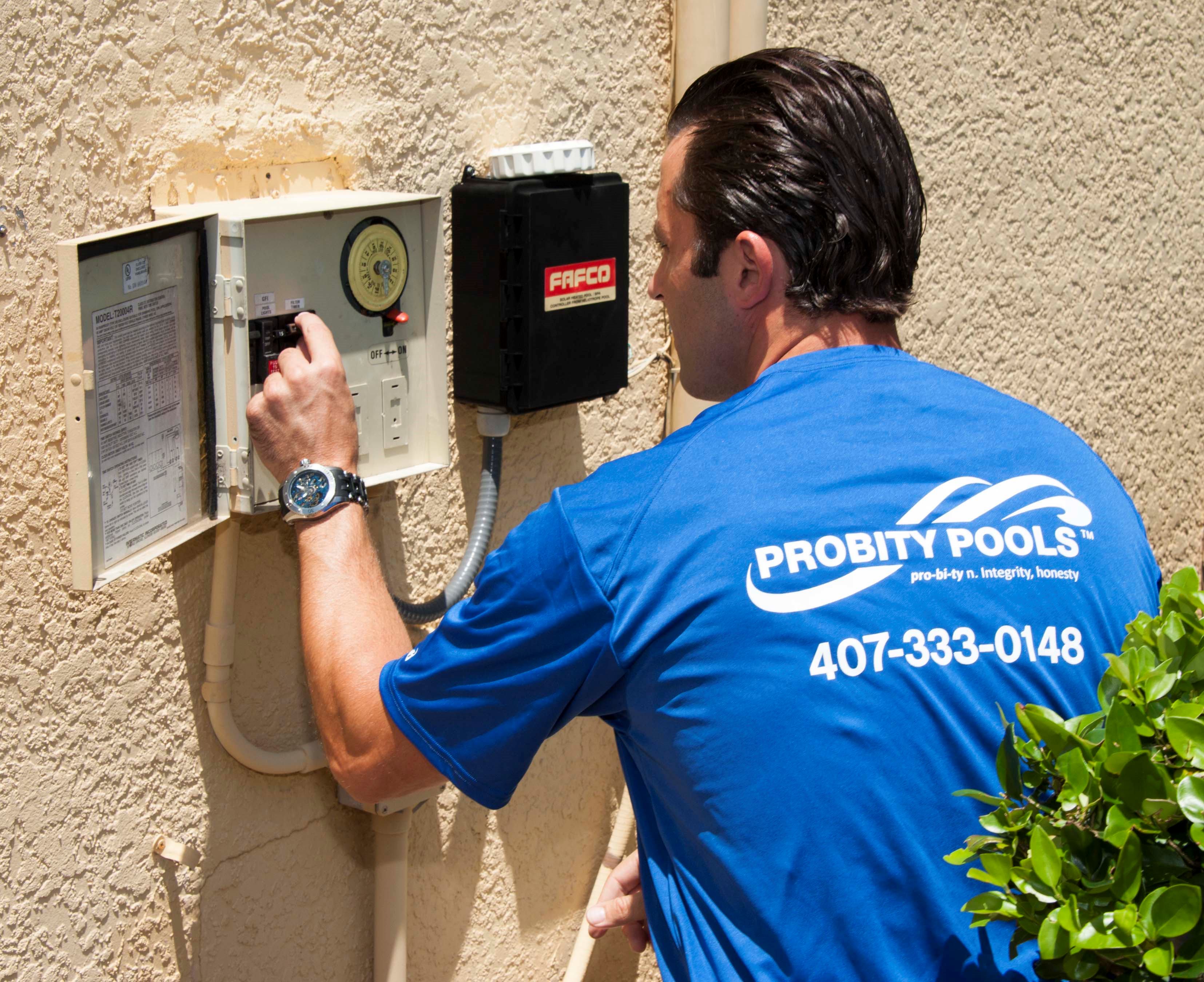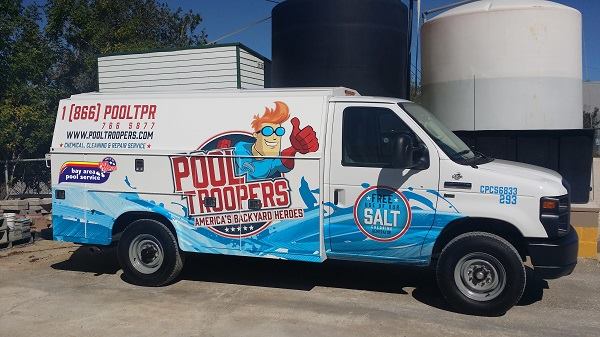At some point in every company’s lifetime, the owners will confront a fork in the road: Rebrand or stay the course? There are many reasons to consider a rebrand. Perhaps the business model has changed, or there’s a plan in place to expand into new markets. Or the company’s original name may be too similar to others in the industry.
Here, PSN offers case studies showing how three companies used rebranding to help them entrench new business practices, expand and franchise.
Pool Troopers
Launched in 2014, Pool Troopers is the new and updated brand for a pool maintenance company previously known as Bay Area Pools & Spas.
The company had brand recognition spanning more than 60 years in Tampa and Florida’s west coast. The last 40 were under the purview of the Crayton family, who bought the firm in 1971.
Gary Crayton III, whose father bought the service company, undertook the name change as part of an effort to expand to a national level. The firm owns several locations in Texas and has Arizona and Nevada in its sights.
Originally, Crayton planned on changing the brand to Pool Service of America, figuring it would serve better in landlocked areas than the original name, while conveying its new national scope.
“Bay Area Pool Service doesn’t do well in Orlando [or] West Palm Beach,” Crayton says. “One client said, ‘Are you guys lost? This isn’t a bay.’”
He was ready to go with Pool Service of America but thought better of it after he attended a speech by Gair Maxwell, a branding expert and speaker. The presentation emphasized considering the
“why” of a business.
“Everyone says what they do,” Crayton summarizes. “Everyone says, ‘We do it better than everyone else.’ If you can get the why across in your brand, then you speak to people on an emotional level that other people can’t copy.”
After hearing the talk, he believed that “Pool Service of America” definitely represented what the company would do, but it didn’t access the why.
For a more strategic approach, Crayton hired the Canadian advertising agency Seamless Brands.
At first he found the process somewhat intimidating. For one thing, it’s expensive. Secondly, he had to relinquish some control, as Seamless Brands’ process was very probing.
The firm sent observers to Crayton’s existing locations and watched how the company performed internally and externally. There were ride-a-longs, meetings with clients, and interviews with employees.
At times, Crayton found the nearly three-month process to be long and frustrating. (He admits he’s not the most patient person.)
But at the end of that time period, Seamless Brands presented one concept to Crayton and company president Dave Hahmann: The Pool Trooper.
The advertising agency explained that a company’s brand should tell a story almost instantaneously. So the consultants came up with the mascot Trooper Ted.
Initially, Crayton wasn’t a fan of the super hero. “We didn’t consider ourselves cartoonish,” he says.
But featuring Trooper Ted in the new logo helps tell the story of the brand quickly. The new slogan, “America’s Backyard Heroes” also plays on the theme.
Pool Troopers are supposed to be the protector of the backyard, providing the assistance homeowners need. The bright colors are appropriate for a comic book hero, especially in comparison to the older logo, which evoked a 1970s vibe. Even the uniforms look like those of a modern defender.
For Crayton, this gets to the why of his business. “When my guy steps out of the truck, we don’t wear Trooper Ted costumes or Ted logos,” Crayton says. “[But] they’re Trooper Ted. They can solve problems, they can do things that homeowners can’t. That is the story.”
When Crayton expands into new areas, they all carry the Pool Trooper name. But back in the existing stores, they’ve had to assure customers they’re still working with the same company that they’ve trusted for 40 years.
To help with the transition, the original Bay Area logo was updated to the new color scheme. In the upper corner, a patch reading, “Home of the Pool Troopers” was added.
“[We’ll] have Bay Area on the local trucks, but eventually we’ll make it Pool Troopers,” Crayton says. “That’s going to take time. The Bay Area name has a lot of power from a brand standpoint.”
It’s a slow process but one that Crayton plans to see through for the health and growth of the company.

Credit: Probity Pools
Franchise Ready: Tropical Breeze Pools became Probity Pools because company owner Kevin Baron didn’t want consumers in new markets to confuse his company with similarly named pool firms.
Probity Pools
Unlike the others, Orlando, Fla.-based Tropical Breeze Pools didn’t have decades of history to overcome when it switched names to Probity Pools earlier this year.
In fact, the company was just 9 years old when its president, Kevin Baron, decided to franchise. But the original moniker wouldn’t translate to a franchise for one simple reason: “We could not trademark Tropical Breeze Pools,” Baron says.
As a trademark attorney explained, his old name wouldn’t work if he expanded into new areas.
“Even if you have the trademark, if there are other businesses with [similar names] in an area you can’t open in that area,” Baron says.
Certain names can be found across the country — plenty of Clear Waters and Aqua-somethings. Baron needed a name he could comfortably expand in.
“If someone has aspirations to grow outside their city, they’re going to need an unusual name,” he says.
As part of the transition to Probity, all of Baron’s trucks were upgraded to brand new vehicles with Probity wraps. Service technicians were given new shirts and name tags.
Baron handled all the rebranding, including the new name, by himself.
Similar to Crayton, Baron looked for names that represented how he runs his business. He even went so far as to include the definition of Probity in the logo: “pro-bi-ty n. integrity, honesty.”
Baron reached out to a marketing firm well after he started the process, to make sure that he was doing it right.
“I came up with the concept and I worked with firms to come up with the logo,” he said.
For the most part, the outside professionals said he had a marketable idea, and they helped refine the logo and color scheme.
The palette also changed to better match the new brand. Tropical Breeze Pool Service had a sunset color combination, while Probity’s logo has a new bluer scheme reminiscent of water and appropriate for the wave graphic.
To prepare customers for the rebrand, Baron held a grand reopening and launched a major public relations campaign using every medium at his disposal, including door hangers, mailers and emails.
“We did get some people [who] were scared that ownership was changing,” he says. “I [made] it very clear in my announcement: ‘This is not an ownership change.’ I was explicit.”
Baron didn’t lose any customers in the transition despite the initial confusion.
He concluded, “For me, getting my brand out there is as important as acquiring customers.”
The Great Backyard Place
For more than 50 years, the May family has operated a retail store in Tennessee. In the 1950s the business began as a filling station with some retail goods, including fish tackle and exotic pets.
Today, it stands firmly in the pool industry, but that didn’t start until 1979 when, as A&M Toys and Hobbies, Tom May began selling Doughboys.
For 30 years, the May family operated its chain of stores as The Pool Place. But last February, the name changed again, this time to The Great Backyard Place.
For Frank May, son of Tom and CEO of the Chattanooga, Tenn.,-based business, the name change isn’t so much a full rebrand as it is one stage of an evolution.
Still, company management didn’t want to risk losing the brand equity they had worked so hard to earn. So they chose not to stray far from the existing logo.
“It’s intentional to tie us to our history,” May says. “[There’s] no reason to ditch that.”
To do this, the company retained the same font and graphics on its mark — the sun, leaf and water droplet comprising the logo, which the company began using in 1999.
“[It] takes time to associate a mark with a brand,” May says. “In Chattanooga and Knoxville, we had a lot of brand equity in The Pool Place.”
In fact, some customers still write “The Pool Place” on their checks. But May is fine with that. For existing customers, he says, the only difference between the new brand and the old one should be the name.
Such changes show a crucial willingness to adapt, but they also involve some risk.
“You don’t do it because you think it’s going to cause a bump in sales,” May says. “It might even go the other direction. … It might take people five years to catch on.”
According to May, two catalysts caused him to start considering a name change in the spring of 2014.
‘It didn’t make sense to associate myself with one product when we have a whole host of products that customers have an appetite for.’ — Frank May
First, when he took over the business from his father in 2003, he made it a priority to begin selling patio furniture out of the Knoxville store. This expanded to all locations in 2005.
Second, he began the process of expanding into new markets. May says he considered maintaining the original name at the existing stores while using the Great Backyard for all new branches. However, he felt that would be too confusing.
“It didn’t make sense to associate myself with one product when [we offer] a whole host of products that customers have an appetite for,” he says.
Last fall, he began marketing the new name. Signs were made, and TV and radio ads were purchased. It’s too soon to know if the change has been financially successful. Sales were down in Chattanooga but high in Knoxville this past year. However, he believes that people eventually will associate with The Great Backyard Place the same as they did with The Pool Place.




